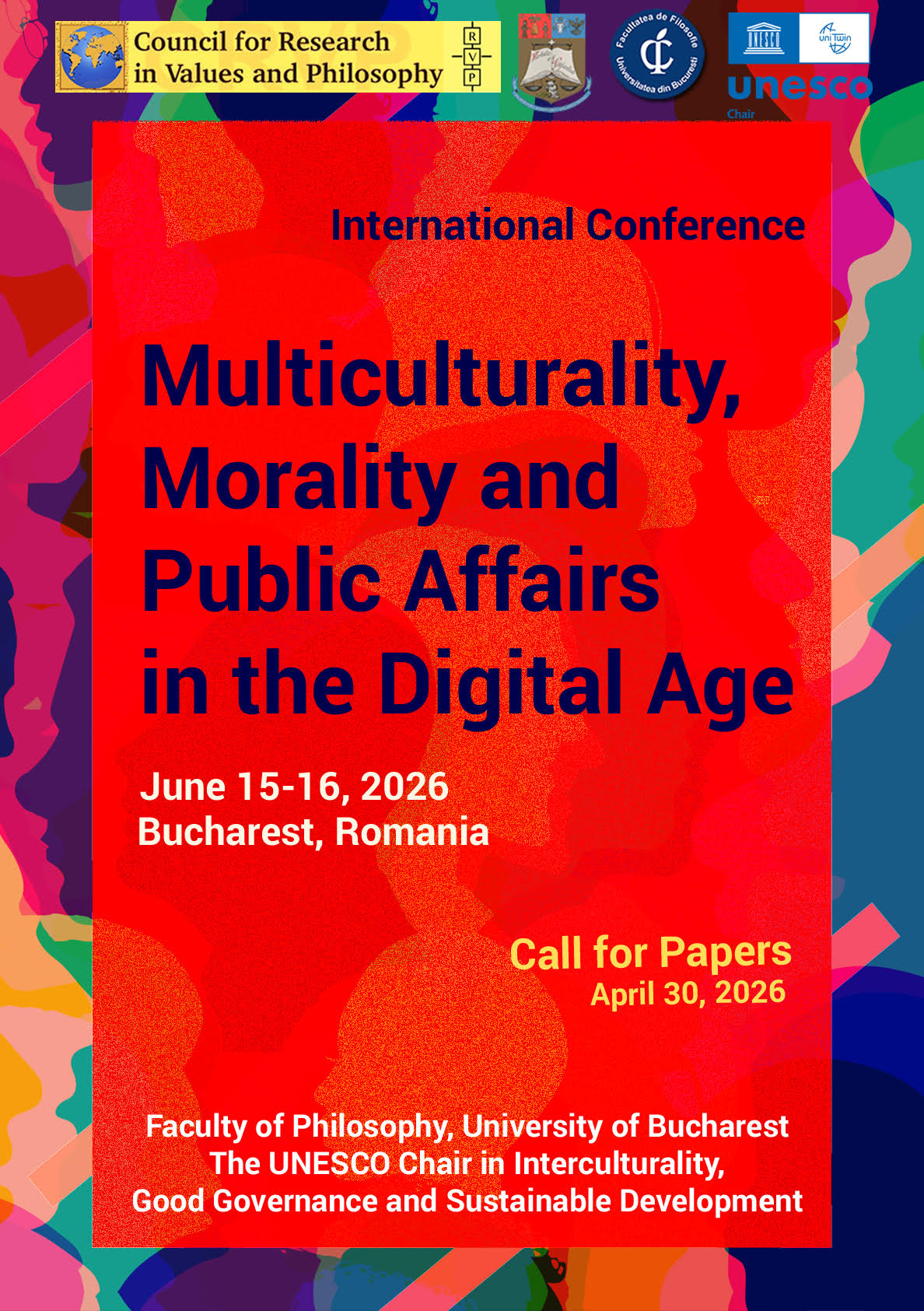International Conference "Multiculturality, Morality, and Public Affairs in the Digital Age"
June 15-16, 2026
International Conference
Multiculturality, Morality, and Public Affairs in the Digital Age
June 15-16, 2026 Bucharest, Romania
Faculty of Philosophy, University of Bucharest
The UNESCO Chair in Interculturality, Good Governance and Sustainable Development
Thematic Description
Multiculturality can be understood as a phenomenon that positively values the presence of diverse cultures within a state or region, attributing significance to a type of pluralism that prevents the dominance of certain cultures over others. In this context, multiculturality serves as an alternative to the homogenization tendencies induced by globalization. As a concept, multiculturalism allows for the exploration of various social groups’ cultures (such as women, linguistic minorities, youth subcultures, religious confessions, etc.) as well as of the cultures of immigration and ethnic minorities, thereby facilitating a better expression of their identities based on the principle of mutual social acceptance.
Morality pertains to a framework of thoughts and actions that guide individual and group life. It can be a code of norms, or a list of values, or a particular vision of nature, or a justification for certain frameworks. Morality concerns about what is considered good or bad. In terms of religious understanding, for instance, biblical norms for Christians are moral. While ethical theories constitute concepts, propositions, principles of moral attitudes that have been developed throughout the human history.
Public affairs involve efforts to manage relationships among public institutions so as to influence public policy and shape public perception. This includes governmental relationships, media communications, and the building of bridges to foster mutual understanding in the broader public and political landscape. Its primary goal is to influence public policies, public opinions, legal and media organizations through proper communication in order to promote general interest and the common good.
Contemporary society has been shaped by diverse cultural traditions, religions, and various political and socio-economic systems, etc. These elements have significantly contributed to the transmission of ideas, enriching the multicultural aspect of contemporary life and fostering mutual understanding among diverse communities. Through history, multicultural dialogue enhanced by scientific and philosophical ideas has enabled significant progresses in fields of mathematics, medicine, astronomy, and technology across the world. In recent decades, digital advancements have not only increased the speed of communication but also revolutionized all aspects of human life.
This pluralistic and interdisciplinary forum aims at exploring questions regarding how philosophical ideas, shaped by local contexts, transcend cultural, linguistic, and geographical boundaries. It intends (1) to understand how philosophical concepts or schools of thought can influence societies in the process of social progress; (2) to highlight the new paths generated by scientific discoveries and technological innovation; (3) to comprehend the meaning of morality in culture and public life; (4) to tackle the challenges that are brought about by the digital age.
Our contemporary digital age requires new ideas and insights to better understand the dynamic and challenges of new socio-political, moral, cultural, and religious situations. The constructive contributions of multiculturalism, morality, and public life can strengthen the social fabric and create a more inclusive future society. People may ask: What challenges does the digital age bring to these areas of interest? How has scientific progress changed the way people think and act? What are the fundamental ideas that govern our life and society? Can the digital age change these ideas? What are the similarities and differences in terms of mentalities, attitudes, or values throughout various transformative periods in human history?
This forum would like to invite scholars and thinkers who are interested in the following themes:
– Dialogue among cultures and religions in the transmission of philosophical ideas and ethical theories.
– Morality as a framework of values and norms that shape individuals and communities.
– New challenges generated by the 20th-century scientific progress and the 21st-century technological revolution.
– Socio-political issues arising from new scientific discoveries and information explosions.
– The impact of media and technology on the dissemination of philosophical ideas and education.
Abstract
Participants are kindly asked to submit their abstract of 300-500 words and a brief professional bio (in Microsoft Word or PDF) to the organizers by April 30, 2026. Questions and clarifications can be addressed to Prof. Dr. Mihaela Pop (mihaela.pop@filosofie.unibuc.ro; pop.mihaela.a@gmail.com) and Dr. Oana Serban (oana.serban@filosofie.unibuc.ro), as well as (cua-rvp@cua.edu).
The results of the evaluation will be known by May 15, 2026. The conference will be held in English. Well-developed, qualitative papers will be published by the Council for Research in Values and Philosophy in its publication series “Cultural Heritage and Contemporary Changes.”
Logistics
There will be no registration fee. Conference participants will cover their own costs of travels. For accommodation costs and additional information, please contact local organizers.
Contact
Prof. Dr. Mihaela Pop
Professor Emerita
Faculty of Philosophy
University of Bucharest
mihaela.pop@filosofie.unibuc.ro; pop.mihaela.a@gmail.com
and
Dr. Oana Serban
Lecturer
Faculty of Philosophy
University of Bucharest
oana.serban@filosofie.unibuc.ro

